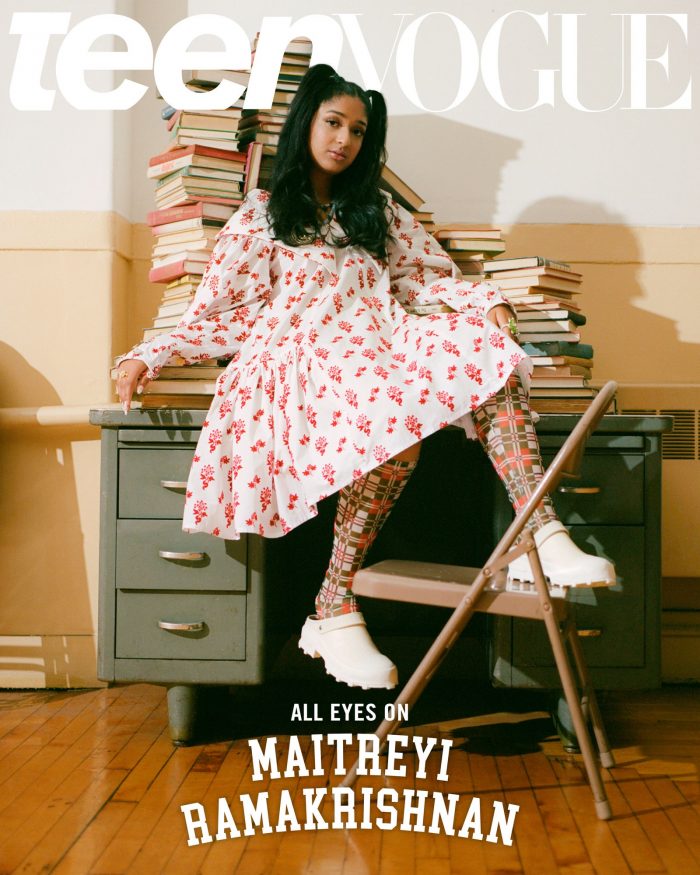Maitreyi Ramakrishnan, star of Netflix comedy series Never Have I Ever, is an ardent advocate for diversity and gender equality. Check out the Tamil-Canadian actress’s conversation with former US Ambassador for Global Women’s Issues Melanne Verveer.
Melanne Verveer For those unfamiliar with Never Have I Ever, tell us a bit about the show.
Maitreyi Ramakrishnan The show follows the story of an Indian American teenage girl in Sherman Oaks. And just going through high school, dealing with the loss of her father, dealing with her friends and then, of course, her own family, her relationship between her mom and her cousin. Devi herself is this hot-headed but insanely smart, probably too smart for her own good, really rambunctious girl that just goes out there and gets what she wants.

Melanne Verveer The show has been praised in Canada and in the United States also for its diverse cast, which you alluded to. Why, in your view, is diverse and authentic representation so important?
Maitreyi Ramakrishnan I was just talking to my mom and I was like: “Damn, I’m the lead of this show where the girl is South Asian.” It really just makes my day because I just know it will have such a great impact for people looking for that representation because it is important. And I became normalized to that fact that… I guess characters just don’t look like me often, especially young South Asian characters that I could relate to. But after I finished filming Never Have I Ever I was like: “This needs to change”. I shouldn’t feel like I’m not being seen. And neither should any minority, no matter your race, ethnicity, sexuality, anything.
Melanne Verveer Do you think there’s a connection between the way we depict our world in entertainment, for example, and the society that we become?
Maitreyi Ramakrishnan I one hundred percent think so. If you don’t see women in positions of power or people of color in power within those movies, it sort of makes you think: “Huh? How is that ever gonna actually happen in reality? And that’s why it’s important to put those characters that are on screen into powerful roles. Because that normalizes this idea of, yes, we can all actually be in politics, in the real world. We can actually be a part of those peacemaking decisions because our opinions, our values, our stories have immense value to bring to the table.
Melanne Verveer You’re so right. Now, I know that you were born in Canada to Tamil parents who had to flee Sri Lanka as refugees because of the civil war there. Now, how has your family’s history impacted you both personally and professionally?
“I shouldn’t feel like I’m not being seen. And neither should any minority, no matter your race, ethnicity, sexuality, anything. “
Maitreyi Ramakrishnan I’m really grateful for learning my family’s history. It also gave me this understanding of social justice that I think was put into my brain as a kid so that now it’s just so natural to me. I remember when I was younger, my mom would always take me out to protests and by the time I was in, like middle school and high school, like that was no stranger to me. Doing a walkout—that wasn’t anything new that felt out of the ordinary.
Melanne Verveer I was thinking about gender equality because women everywhere are still on a journey to achieve full gender equality. Is that important to you as well on a personal level?
Maitreyi Ramakrishnan With my whole heart, I say it is so important to me because, of course, I am a woman and… it’s just…. Nothing infuriates me more when somebody looks at a woman or looks at me, I guess, and says… thinks less of me or thinks my value is any bit less because I am a woman. It’s a movement that is still very fragile. That can be broken very easily with, you know, whatever law that has to pass that sets us back, whatever icon we lose. Ruth Bader Ginsburg. Perfect example, true feminist icon. It is so fragile that when we lose somebody like that, we feel it because we know how hard we’re working for it still to this day.

Melanne Verveer I know that you’re very actively engaged in trying to address gender inequalities. And one way you’re doing that is as the Global Ambassador for Plan International Canada. And for our listeners who don’t know about Plan, an organization that champions gender equality and children’s rights around the world. Maitreyi, how did you get involved with Plan?
Maitreyi Ramakrishnan I think I was like 10 years old when I was just going to the mall and, you know how Plan—they’ll be around the malls, like handing out brochures and just information for people to learn more. So I was learning about this and I was genuinely shocked. I was like: “I’m out here thinking I’m never gonna get married and children my age are getting married?” I remember that feeling and thinking: “This is wrong.” And ever since then, that has been a contributing factor to fueling my brain towards social justice and learning more about what’s going on in the world. So I reached out to Plan International Canada and I said: “Hey, how can I help you guys?” And I asked them: “Is it possible before I become a Global Ambassador that I actually maybe take some courses with you guys to learn about every single thing?”
Melanne Verveer Can you tell us about the work that you’re doing with Plan to compel social media companies to take action to stop online harassment?
Maitreyi Ramakrishnan Yeah, it’s actually really brutal and I think the scariest part of it when it comes to online harassment, the scariest part to me is just how normalized it is. If you put yourself out online, if you go put yourself out [there] in this way, you should just expect to be harassed. You should just expect those comments. That’s wrong. Why did we create this mentality? Why did we get to this point where we think that harassment, just because it’s behind a screen, is OK? At the end of the day, harassment is harassment.
Melanne Verveer Why do you think young people are important in the fight for gender and racial equality?
Maitreyi Ramakrishnan Well, of course, we’re going to be the changemakers. The world truly is in our hands, right? I think if we focus on empowering youth and giving them that courage to stand up for others on the level of respect and inclusivity, and just true equality and equity, I think the world can hopefully become a better place.
Melanne Verveer So what’s your call to action for them? And by calling them to action, for young students everywhere?
Maitreyi Ramakrishnan Don’t wait until you have a big platform or you have… however many followers. And as long as you stay true to yourself, you educate yourself and you’re always staying aware, you’re gonna be fine.
To hear more of the conversation, check out Georgetown’s Seeking Peace podcast. This Q&A was prepared by India Ellis.


